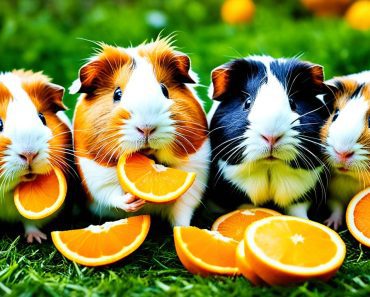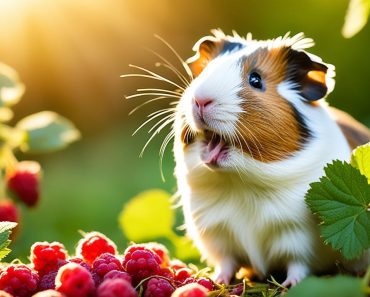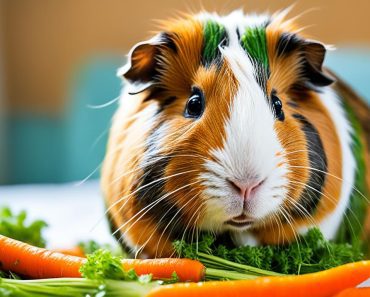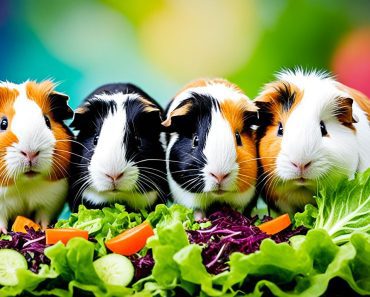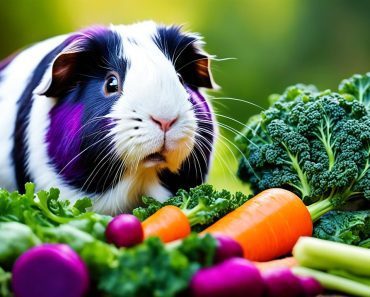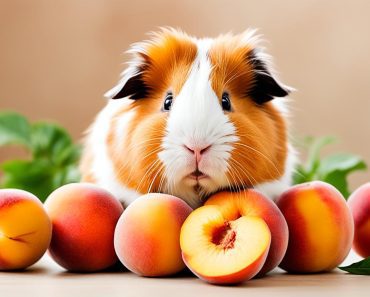As a proud guinea pig owner, I always strive to provide the best care and nutrition for my furry friends. One question that often comes up is, “Can guinea pigs eat cauliflower?” Well, the answer is yes, but there are a few important things to consider before adding cauliflower to your guinea pig’s diet.
Cauliflower is a vegetable that is rich in vitamins and nutrients that can be beneficial for guinea pigs, such as vitamin C, vitamin K, and fiber. These elements contribute to their overall health and well-being. However, it’s crucial to be mindful of the calcium and phosphorus content in cauliflower, as too much calcium can lead to bladder stones in guinea pigs. Additionally, cauliflower may cause gas and bloating in some furry friends. Therefore, moderation is key when it comes to feeding cauliflower to guinea pigs.
When introducing cauliflower to your guinea pig, it’s essential to start with a small amount and monitor their response. Always wash the cauliflower well to remove any pesticides before feeding it to your furry friend. Over time, you can gradually increase the portion size, but it’s best to limit cauliflower as a treat to once or twice a week to ensure the safety and health of your guinea pig.
Remember, a balanced diet for guinea pigs includes hay, other vegetables, and a variety of safe options. Providing these essentials alongside cauliflower will contribute to their overall nutritional needs and well-being.
Can Guinea Pigs Eat Cauliflower? Yes, with proper caution.
- Cauliflower can be included in a guinea pig’s diet, but moderation is important.
- Take into consideration the calcium and phosphorus content in cauliflower to prevent bladder stones in guinea pigs.
- Introduce cauliflower gradually and monitor your guinea pig’s response.
- Wash cauliflower thoroughly to remove any pesticides before feeding it to your guinea pig.
- Provide a balanced diet that includes hay, other vegetables, and a variety of safe options.
Nutritional Benefits of Cauliflower for Guinea Pigs
Cauliflower is a highly nutritious vegetable that offers several benefits for guinea pigs. It contains essential vitamins and minerals that contribute to their overall well-being and health.
One of the key benefits of cauliflower for guinea pigs is its high vitamin C content. Vitamin C is crucial for the immune system of guinea pigs, helping to prevent diseases and keeping them healthy. Including cauliflower in their diet can help ensure that guinea pigs receive an adequate amount of this vital nutrient.
Cauliflower also contains vitamin K, which plays a role in blood clotting. This vitamin can provide added benefits for guinea pigs, especially if they experience any injuries or wounds.
Fiber is another important component of cauliflower. It aids in maintaining a healthy digestive system in guinea pigs, preventing issues such as constipation and promoting regular bowel movements.
Moreover, cauliflower is low in sugar, making it an excellent choice to prevent obesity and diabetes in guinea pigs. It can be included in their diet as a nutritious and low-calorie snack.
Cauliflower is a great source of vitamins and fiber for guinea pigs, supporting their immune system, digestive health, and weight management.
In addition to these benefits, cauliflower contains omega fats, which contribute to a soft and shiny coat in guinea pigs. It also helps prevent the onset of osteoarthritis, a common condition in older guinea pigs, due to its anti-inflammatory properties.
While cauliflower offers numerous nutritional advantages, it is important to remember that moderation is key. Guinea pigs require a balanced diet that includes a variety of vegetables, hay, and grass. Excessive consumption of cauliflower, particularly its high calcium content, may lead to bladder stones. Therefore, it is crucial to monitor the amount of cauliflower given to guinea pigs and ensure it is part of a well-rounded nutritional plan.
Considerations and Drawbacks of Feeding Cauliflower to Guinea Pigs
While cauliflower can provide nutritional benefits for guinea pigs, it’s important to be mindful of certain considerations and potential drawbacks. The calcium and phosphorus content present in cauliflower can be problematic if not properly moderated, as excessive calcium intake can lead to bladder stones in guinea pigs. Additionally, cauliflower may cause gas and bloating in some guinea pigs, which can be uncomfortable for them. Monitoring your guinea pig’s waste output is crucial to detect any digestive issues that may arise from consuming cauliflower.
In addition, thorough washing of cauliflower is necessary before feeding it to your guinea pig to ensure the removal of any pesticides that may be present. Taking these factors into account, cauliflower can still be included in a guinea pig’s diet, but moderation is key. Pay attention to your guinea pig’s individual response and adjust the portion size accordingly to prevent any potential health issues.
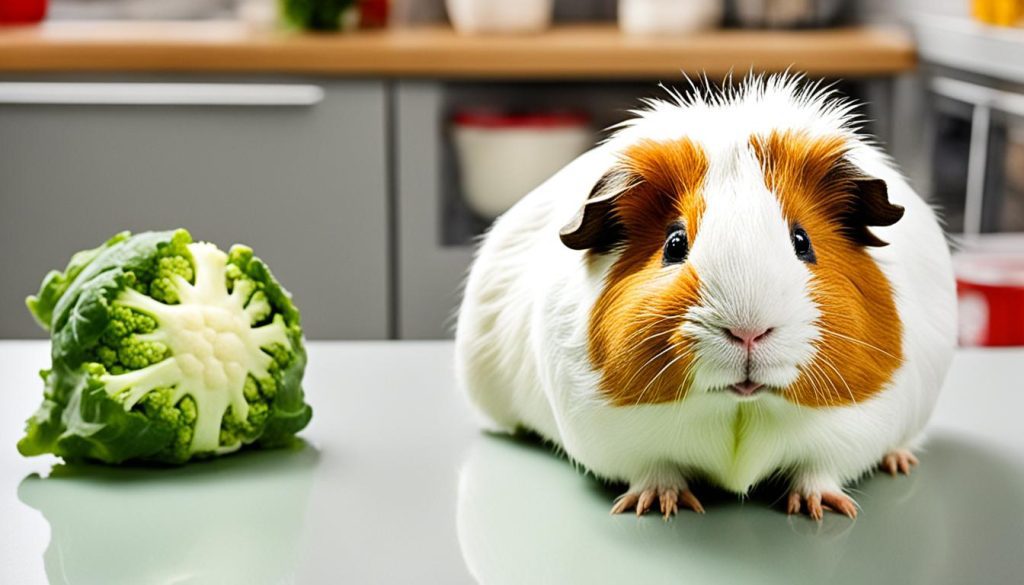
When introducing cauliflower into your guinea pig’s diet, it’s important to do so gradually and in small amounts. This will allow you to monitor their response and ensure their digestive system can handle the addition of this vegetable. If you notice any negative effects, such as changes in stool consistency or signs of discomfort, it may be necessary to reduce or eliminate cauliflower from their diet.
Remember, every guinea pig is unique, and their tolerance to cauliflower may vary. It’s always best to consult with a veterinarian knowledgeable about guinea pig care to ensure you are providing the best diet for your furry friend.
By considering these drawbacks and monitoring your guinea pig’s well-being, you can safely incorporate cauliflower into their diet as part of a balanced and varied nutritional plan.
How to Feed Cauliflower to Guinea Pigs
When it comes to feeding cauliflower to your guinea pigs, proper preparation is key. Follow these steps to ensure your furry friends enjoy this nutritious treat:
- Wash the cauliflower: Begin by thoroughly washing the cauliflower to remove any pesticides. This step is crucial to safeguard your guinea pigs’ health.
- Start small: Introduce a small portion of cauliflower to your guinea pigs’ diet, such as a half-inch floret or a single leaf. This allows you to gauge their response and ensure there are no negative effects on their digestion.
- Monitor and adjust: Watch closely for any digestive issues or changes in your guinea pigs’ excrement. If everything goes well, gradually increase the portion size to a one-inch floret over time.
- Limit as a treat: While guinea pigs can enjoy cauliflower, it should be given in moderation. Limit cauliflower as a treat to once or twice a week to prevent any potential digestive issues.
- Consider their preferences: Keep in mind that guinea pigs may prefer the leaves of cauliflower over the florets. Offer both options and observe their preferences.
Remember, it’s essential to monitor your guinea pigs’ response to any new food and make adjustments accordingly. Always prioritize their well-being and consult a veterinarian if you have any concerns or questions.
Other Vegetables for Guinea Pigs
While cauliflower can be included in a guinea pig’s diet, it is important to provide a variety of vegetables to ensure a balanced and nutritious diet for your furry friend. Offering a diverse range of vegetables not only adds excitement and enrichment to their meals but also provides a wider array of essential vitamins and minerals. Here are some safe vegetables that you can offer to your guinea pig:
- Asparagus
- Broccoli
- Cabbage
- Carrots
- Corn on the cob
- Cucumber
- Green beans
- Peas
- Parsley
- Turnip greens
- Watercress
- Red cabbage
- Red peppers
When introducing new vegetables to your guinea pig’s diet, it’s important to be mindful of their nutritional content. Moderation is key, as overfeeding certain vegetables can lead to digestive issues. It’s always a good idea to consult with a veterinarian or do thorough research to ensure you are offering the right portion sizes and a balanced diet.
Remember, while vegetables are an important part of a guinea pig’s diet, hay and grass should still make up the majority of their meals. These fibrous foods help maintain a healthy digestive system and are essential for their overall well-being. Introducing a variety of vegetables alongside a hay-based diet adds nutritional diversity and ensures your guinea pig receives all the necessary nutrients for optimal health.
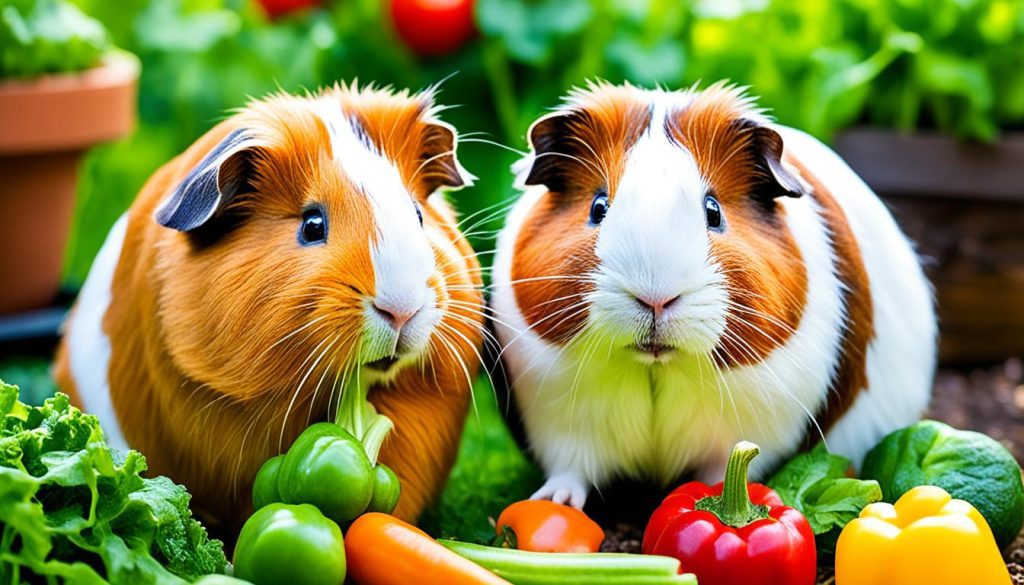
Providing a varied diet not only keeps your guinea pig well-nourished but also stimulates their natural foraging instincts and adds excitement to their feeding routine. Just like humans, guinea pigs enjoy a diverse and flavorful diet. So go ahead and experiment with different vegetables to keep your furry friend happy and healthy!
Importance of Hay and Grass in a Guinea Pig’s Diet
When it comes to a guinea pig’s diet, hay and grass play a crucial role. They provide essential fiber that is necessary for maintaining a healthy digestive system in guinea pigs. But their importance goes beyond just digestion.
Hay and grass are also vital for dental health in guinea pigs. The constant chewing that is required when eating hay and grass helps control the growth of their teeth. This is important because guinea pigs’ teeth grow continuously throughout their lives, and if they don’t wear them down properly, it can lead to dental disease and other oral health issues.
Without sufficient hay and grass in their diet, guinea pigs can develop serious dental and digestive problems. So, it’s essential to ensure that they have access to unlimited amounts of high-quality hay and grass at all times.
When choosing hay for adult guinea pigs, Timothy hay is recommended. It has a lower calcium content and is higher in fiber, making it an ideal choice for their nutritional needs. On the other hand, baby guinea pigs can be given alfalfa hay, which is higher in calcium. However, as they grow older, it’s important to switch to hay with lower calcium content to prevent an overabundance of this mineral in their diet.
Providing hay and grass constantly is not only beneficial for their overall health but also helps to prevent boredom and encourages natural foraging behavior. Additionally, the high fiber content in hay and grass promotes regular bowel movements, which is important for maintaining a healthy digestive system in guinea pigs.
Guinea pigs should always have access to fresh, clean hay and grass. It should be included as the main component of their diet, along with a variety of vegetables and limited amounts of treats. Remember to monitor the cleanliness of their hay and grass, and always change it regularly to prevent contamination.
Conclusion
Guinea pigs can safely enjoy cauliflower as part of their diet, but it is important to practice moderation. Cauliflower provides essential vitamins and nutrients, including vitamin C and fiber, which contribute to guinea pig health and nutrition. However, the calcium and phosphorus content in cauliflower should be monitored to prevent issues such as bladder stones. Some guinea pigs may also experience gas and bloating from consuming cauliflower.
To ensure the well-being of your guinea pigs, it is crucial to monitor their response to cauliflower and adjust the portion size accordingly. Remember to always wash vegetables, including cauliflower, thoroughly to remove any pesticides before feeding them to your guinea pigs. Additionally, maintaining a balanced diet that includes a variety of vegetables and unlimited access to hay and grass is vital for their overall health.
By providing a carefully curated diet and practicing moderation, you can ensure that your guinea pigs receive the necessary nutrients while minimizing potential risks. Paying attention to their diet and offering a variety of safe vegetables will contribute to their health and happiness. Remember, the importance of a guinea pig’s diet lies in its variety and moderation, ensuring a balanced and nutritious meal plan that promotes their well-being.

